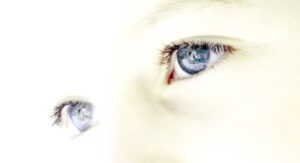
And the blind man said to him, "Rabbi, let me recover my sight" (Mark 10:51).
Since childhood in Sunday School, many of us remember the character; probably in part because his unusual, multi-syllabic name resonates in our ears and lyrically fit the children's chorus.
But Bartimaeus is unique for another reason.
The Gospels record Jesus performing approximately 26 specific miracles of healing – eradicating leprosy, liberating from demonic oppression, instantly repairing damaged limbs and disabilities, and restoring sight – but only one privileged recipient of His supernatural power is named.
Blind Bartimaeus.
And Jesus said to him, "Go your way; your faith has made you well." And immediately he recovered his sight and followed him on the way (v.52).
Human eyes are a pair of complex optical organs. When healthy, our eyes detect and convert light into electro-chemical impulses, transmitting these signals to the brain. Vision results.
In the Greco-Roman world of the 1st century, blindness was much more common – everyone knew several people unable to see. Some were blind from birth (like the man Jesus healed in John 9); others lost their sight through disease, injury, inadequate hygiene, or advanced age.
And in the Hebrew legal code, carelessly causing someone to lose sight was considered such a serious violation, that the “eye for an eye” maxim was promoted and enforced.
And, as someone who has benefitted from ophthalmological intervention, this made me squirm: in western Europe, cataracts have been treated with curved needles piercing the eye from before the time of the New Testament.
However, although historical research demonstrates many interventions for vision correction – albeit many causing more damage than improvement – the Old Testament does not contain a single example of a miraculous healing of permanently blind eyes.
That all changed with the coming of Jesus.
And that ability proved His identity.
Here’s how.
The Hebrew people understood that the coming Messiah, or Christ, would be identified as the One who could restore sight to the blind. In Israel’s history as recorded in the Old Testament, people had been healed of leprosy and other maladies. Three times the dead had been raised to life.
But the restoration of sight was the sole purview of the Messiah, twice predicted by the great Hebrew prophet Isaiah.
Here the prophet describes the future joy of Israel’s redeemed at the coming of the Messiah: The desert and the parched land will be glad; the wilderness will rejoice and blossom…they will see the glory of the LORD, the splendor of our God...your God will come, he will come with vengeance; with divine retribution he will come to save you." Then will the eyes of the blind be opened…(Isaiah 35:1-5).
And again as he penned Isaiah 42, the prophet was declaring predictively what came to be recognized as a Messianic passage describing the Servant of the Lord: I, the LORD, have called you in righteousness; I will take hold of your hand. I will keep you and will make you to be a covenant for the people and a light for the Gentiles, to open eyes that are blind…(v.6,7).
And we don’t want to miss the part that played in irrefutably identifying Jesus as the Messiah to careful observers.
Including John the Baptist.
John’s meteoric rise to public ministry probably lasted no more than one year. Although faithful to his task, initially hugely popular among the Jewish people as the first prophet from God in 400 years, and very effective as the forerunner to Christ, John’s despondency grew as he rotted in the prison cell of Herod Antipas.
As the news about Jesus spread throughout Judea and Galilee, John sent 2 disciples to ask Jesus about His identity: “Are you the one who is to come, or should we expect someone else?" Jesus replied, "Go back and report to John what you hear and see: The blind receive sight… (Matthew 6:3-5).
Jesus went on to say that He also healed the lame, cured leprosy, restored hearing to the deaf, even raised the dead.
But He need not say more – at least for John’s benefit.
Once John heard Jesus had restored sight to blind eyes, his mind would have immediately flashed back to the prophecies of Isaiah.
The indisputable Messianic identity was tied to this critical piece of information: the ability to restore sight was a sure indication that this must be the long-expected Christ.
John was satisfied. And he took that knowledge to the grave, because he was beheaded by Herod mere months – or weeks – later.
Takeaway: The multiple predictive threads working their way through the various books and centuries of the Old Testament are fulfilled completely, astonishingly, wonderfully in the person of Jesus of Nazareth, the Messiah of God.
In the Sermon on the Mount, He warned about the need to absorb the light of His truth with our spiritual eyes: The eye is the lamp of the body. If your eyes are good, your whole body will be full of light. But if your eyes are bad, your whole body will be full of darkness. If then the light within you is darkness, how great is that darkness! (Matthew 6:22,23).
The Messiah’s ability to eliminate physical sightlessness was a graphic illustration of His ability to banish spiritual blindness.
But blessed are your eyes because they see…(Matthew 13:16).
~ graphic by criswatk, freeimages.com
note: a version of this post appeared originally in May 2016.